| Listing 1 - 10 of 61 | << page >> |
Sort by
|
Book
ISBN: 1400873703 Year: 2015 Publisher: Princeton, NJ : Princeton University Press,
Abstract | Keywords | Export | Availability | Bookmark
 Loading...
Loading...Choose an application
- Reference Manager
- EndNote
- RefWorks (Direct export to RefWorks)
Charles Maier, one of the most prominent contemporary scholars of European history, published Recasting Bourgeois Europe as his first book in 1975. Based on extensive archival research, the book examines how European societies progressed from a moment of social vulnerability to one of political and economic stabilization.Arguing that a common trajectory calls for a multi country analysis, Maier provides a comparative history of three European nations and argues that they did not simply return to a prewar status quo, but achieved a new balance of state authority and interest group representation. While most previous accounts presented the decade as a prelude to the Depression and dictatorships, Maier suggests that the stabilization of the 1920s, vulnerable as it was, foreshadowed the more enduring political stability achieved after World War II.The immense and ambitious scope of this book, its ability to follow diverse histories in detail, and its effort to explain stabilization-and not just revolution or breakdown-have made it a classic of European history.
Europe --- Politics and government --- Economic conditions --- Aristide Briand. --- Benito Mussolini. --- Cartel des Gauches. --- Europe. --- Fascists. --- France. --- Francesco Saverio Nitti. --- Georges Clemenceau. --- Germany. --- Giovanni Giolitti. --- Gustav Stresemann. --- Italy. --- Joseph Wirth. --- Radical Socialist Party. --- Raymond Poincar. --- Ruhr conflict. --- Social Democratic Party. --- Vittorio Emanuele Orlando. --- World War II. --- big business. --- bourgeois. --- bourgeoisie. --- capitalism. --- class divisions. --- class. --- coal industry. --- coalitions. --- conservatives. --- corporatism. --- deflation. --- economic restructuring. --- economic stabilization. --- elections. --- elites. --- fascism. --- heavy industry. --- inflation. --- interest groups. --- labor market. --- left. --- liberalism. --- majorities. --- mass communications. --- moderation. --- nationalism. --- parliamentary elections. --- parliamentary politics. --- parliaments. --- political ecology. --- political economy. --- political stabilization. --- politics. --- recession. --- reparations. --- revaluation. --- social conflict. --- social democracy. --- social vulnerability. --- socialists. --- socialization. --- sovereignty. --- stability. --- state authority. --- taxes. --- terrorism. --- unions.

ISBN: 0691052204 Year: 1975 Publisher: Princeton, N.J. Princeton University Press
Abstract | Keywords | Export | Availability | Bookmark
 Loading...
Loading...Choose an application
- Reference Manager
- EndNote
- RefWorks (Direct export to RefWorks)
History of Germany and Austria --- History of Italy --- History of France --- anno 1930-1939 --- anno 1940-1949 --- anno 1920-1929 --- #SBIB:94H0 --- Geschiedenis van Europa: algemeen --- Europe --- Council of Europe countries --- Eastern Hemisphere --- Eurasia --- Economic conditions --- -Politics and government --- -Europe --- Politics and government --- -#SBIB:94H0 --- -History of Germany and Austria
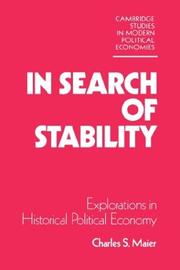
ISBN: 0521346983 9780521346986 9780511583995 9780521230018 Year: 1987 Publisher: Cambridge: Cambridge university press,
Abstract | Keywords | Export | Availability | Bookmark
 Loading...
Loading...Choose an application
- Reference Manager
- EndNote
- RefWorks (Direct export to RefWorks)
Fascism --- -Representative government and representation --- -330.34 --- 338 (4) --- 338.22 --- AA / International- internationaal --- EUR / Europe - Europa --- 331.31 --- 331.100 --- 330.46 --- Parliamentary government --- Political representation --- Representation --- Self-government --- Constitutional history --- Constitutional law --- Political science --- Democracy --- Elections --- Republics --- Suffrage --- Neo-fascism --- Authoritarianism --- Collectivism --- Corporate state --- National socialism --- Synarchism --- Totalitarianism --- History --- -Economische ontwikkeling. Regionale economische ontwikkeling --- Economische situatie. Economische structuur van bepaalde landen en gebieden. Economische geografie. Economische produktie.economische produkten. Economische diensten--Europa --- Economische organisatieleer. Economisch beleid. Economische politiek --- Economisch beleid. --- Economische geschiedenis: algemeenheden. --- Hedendaagse periode, met inbegrip van de psychologische school (Oostenrijkse), mathematische school, solidarisme, communisme, marxisme, bolsjewisme, anarchisme. --- Europe --- Council of Europe countries --- Eastern Hemisphere --- Eurasia --- Economic conditions --- -Economic policy. --- 338.22 Economische organisatieleer. Economisch beleid. Economische politiek --- 338 (4) Economische situatie. Economische structuur van bepaalde landen en gebieden. Economische geografie. Economische produktie.economische produkten. Economische diensten--Europa --- 330.34 Economische ontwikkeling. Regionale economische ontwikkeling --- Economische ontwikkeling. Regionale economische ontwikkeling --- Economisch beleid --- Economische geschiedenis: algemeenheden --- Hedendaagse periode, met inbegrip van de psychologische school (Oostenrijkse), mathematische school, solidarisme, communisme, marxisme, bolsjewisme, anarchisme --- -History --- -Europe
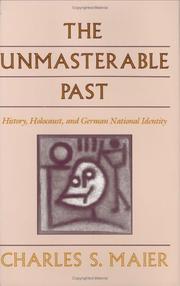
ISBN: 0674929756 Year: 1988 Publisher: Cambridge (Mass.) Harvard University Press
Abstract | Keywords | Export | Availability | Bookmark
 Loading...
Loading...Choose an application
- Reference Manager
- EndNote
- RefWorks (Direct export to RefWorks)
943.086 --- Historians --- -Holocaust, Jewish (1939-1945) --- -Historiographers --- Scholars --- Geschiedenis van Duitsland: Derde Rijk; Nazi-bewind--(1933-1945) --- Historiography --- Germany --- History --- -Historiography. --- Holocaust, Jewish (1939-1945) --- Historiography. --- -Geschiedenis van Duitsland: Derde Rijk; Nazi-bewind--(1933-1945) --- 943.086 Geschiedenis van Duitsland: Derde Rijk; Nazi-bewind--(1933-1945) --- Historiographers --- Weimar Republic --- Germanii︠a︡ --- Германия --- BRD --- FRN --- Jirmānīya --- جرمانيا --- Nimechchyna --- Gjermani --- Federalʹna Respublika Nimechchyny --- Veĭmarskai︠a︡ Respublika --- Ashkenaz --- Germanyah --- Bundesrepublik Deutschland --- Federal Republic of Germany --- Deutschland --- Repoblika Federalin'i Alemana --- República Federal de Alemania --- Alemania --- República de Alemania --- Bu̇gd Naĭramdakh German Uls --- Kholboony Bu̇gd Naĭramdakh German Uls --- KhBNGU --- ХБНГУ --- German Uls --- Germania --- Republika Federal Alemmana --- Deutsches Reich --- Grossdeutsches Reich --- Weimarer Republik --- Vācijā --- Germany (Territory under Allied occupation, 1945-1955) --- Germany (Territory under Allied occupation, 1945-1955 : British Zone) --- Germany (Territory under Allied occupation, 1945-1955 : French Zone) --- Germany (Territory under Allied occupation, 1945-1955 : Russian Zone) --- Germany (Territory under Allied occupation, 1945-1955 : U.S. Zone) --- Germany (East) --- Germany (West) --- Holy Roman Empire --- ドイツ --- Doitsu --- ドイツ連邦共和国 --- Doitsu Renpō Kyōwakoku --- ドイツ レンポウ キョウワコク --- Deguo --- 德国 --- Gėrman --- Герман Улс
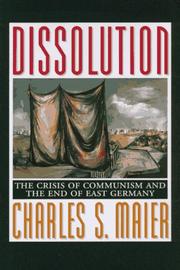
ISBN: 0691078793 0691007462 1400822254 9786612457807 1282457802 1400812585 1400812585 140080504X Year: 1999 Publisher: Princeton, N.J. Princeton University Press
Abstract | Keywords | Export | Availability | Bookmark
 Loading...
Loading...Choose an application
- Reference Manager
- EndNote
- RefWorks (Direct export to RefWorks)
Against the backdrop of one of the great transformations of our century, the sudden and unexpected fall of communism as a ruling system, Charles Maier recounts the history and demise of East Germany. Dissolution is his poignant, analytically provocative account of the decline and fall of the late German Democratic Republic. This book explains the powerful causes for the disintegration of German communism as it constructs the complex history of the GDR. Maier looks at the turning points in East Germany's forty-year history and at the mix of coercion and consent by which the regime functioned. He analyzes the GDR as it evolved from the purges of the 1950s to the peace movements and emerging youth culture of the 1980s, and then turns his attention to charges of Stasi collaboration that surfaced after 1989. In the context of describing the larger collapse of communism, Maier analyzes German elements that had counterparts throughout the Soviet bloc, including its systemic and eventually terminal economic crisis, corruption and privilege in the SED, the influence of the Stasi and the plight of intellectuals and writers, and the slow loss of confidence on the part of the ruling elite. He then discusses the mass protests and proliferation of dissident groups in 1989, the collapse of the ruling party, and the troubled aftermath of unification. Dissolution is the first book that spans the communist collapse and the ensuing process of unification, and that draws on newly available archival documents from the last phases of the GDR, including Stasi reports, transcripts of Politburo and Central Committee debates, and papers from the Economic Planning Commission, the Council of Ministers, and the office files of key party officials. This book is further bolstered by Maier's extensive knowledge of European history and the Cold War, his personal observations and conversations with East Germans during the country's dramatic transition, and memoirs and other eyewitness accounts published during the four-decade history of the GDR.
History of Germany and Austria --- anno 1980-1989 --- anno 1990-1999 --- Opposition (Political science) --- Opposition (Science politique) --- Sozialistische Einheitspartei Deutschlands --- -Opposition (Political science) --- Socialist Unity Party of Germany --- SED --- Sot︠s︡ialisticheskai︠a︡ edinai︠a︡ partii︠a︡ Germanii --- Német Szocialista Egységpárt --- GESP --- Germanska edinna sot︠s︡ialisticheska partii︠a︡ --- SEPG --- Niemiecka Socjalistyczna Partia Jedności --- Kommunistische Partei Deutschlands --- Sozialdemokratische Partei Deutschlands --- Partei des Demokratischen Sozialismus (Germany) --- -Sozialistische Einheitspartei Deutschlands --- Communism --- Sozialistische Einheitspartei Deutschlands. --- Germany (East) --- Germany --- Politics and government --- History --- Communisme --- Allemagne (Est) --- Allemagne --- Politique et gouvernement --- Histoire
Book
ISBN: 9780674059788 0674059786 0674973917 Year: 2016 Publisher: Cambridge Harvard University Press
Abstract | Keywords | Export | Availability | Bookmark
 Loading...
Loading...Choose an application
- Reference Manager
- EndNote
- RefWorks (Direct export to RefWorks)
Throughout history, human societies have been organized preeminently as territories-- politically bounded regions whose borders define the jurisdiction of laws and the movement of peoples. At a time when the technologies of globalization are eroding barriers to communication, transportation, and trade, Once Within Borders explores the fitful evolution of territorial organization as a worldwide practice of human societies. Master historian Charles S. Maier tracks the epochal changes that have defined territories over five centuries and draws attention to ideas and technologies that contribute to territoriality's remarkable resilience. Territorial boundaries transform geography into history by providing a framework for organizing political and economic life. But properties of territory--their meanings and applications--have changed considerably across space and time. In the West, modern territoriality developed in tandem with ideas of sovereignty in the seventeenth century. Sovereign rulers took steps to fortify their borders, map and privatize the land, and centralize their sway over the populations and resources within their domain. The arrival of railroads and the telegraph enabled territorial expansion at home and abroad as well as the extension of control over large spaces. By the late nineteenth century, the extent of a nation's territory had become an index of its power, with overseas colonial possessions augmenting prestige and wealth and redefining territoriality. Turning to the geopolitical crises of the twentieth century, Maier pays close attention to our present moment, asking in what ways modern nations and economies still live within borders and to what degree our societies have moved toward a post-territorial world.--
Political geography --- Territory, National --- Boundaries --- Boundary disputes --- Border disputes --- Disputes, Boundary --- Territorial boundary disputes --- Borders (Geography) --- Boundary lines --- Frontiers --- Geographical boundaries --- International boundaries --- Lines, Boundary --- Natural boundaries --- Perimeters (Boundaries) --- Political boundaries --- Borderlands --- National territory --- Geography, Political --- Human geography --- History. --- Boundaries. --- Boundary disputes. --- Grenze. --- Political geography. --- Politische Geografie. --- Stati --- Territorium. --- Territory, National. --- Territorio --- Storia. --- History

ISBN: 9780674025561 9780674021891 0674025563 0674021894 0674040457 Year: 2006 Publisher: Cambridge, MA: Harvard university press,
Abstract | Keywords | Export | Availability | Bookmark
 Loading...
Loading...Choose an application
- Reference Manager
- EndNote
- RefWorks (Direct export to RefWorks)
This elegantly written book examines the structure and impact of empires and asks whether the United States shares their traits and behavior. Charles S. Maier outlines the essentials of empire throughout history, then explores the exercise of U.S. power in the nineteenth and twentieth centuries. With learning, dispassion, and clarity, Among Empires offers bold comparisons and an original account of American power.
History of North America --- United States --- National characteristics, American --- Imperialism --- History --- Foreign relations --- United States of America --- National characteristics, American. --- History. --- Caractéristiques nationales américaines --- Impérialisme --- Case studies. --- Histoire --- Cas, Etudes de --- Etats-Unis --- Relations extérieures --- National characteristics [American ]

ISBN: 0674040457 9780674040458 0674025563 9780674025561 0674021894 9780674021891 0674021894 Year: 2009 Publisher: Cambridge, MA
Abstract | Keywords | Export | Availability | Bookmark
 Loading...
Loading...Choose an application
- Reference Manager
- EndNote
- RefWorks (Direct export to RefWorks)
This elegantly written book examines the structure and impact of empires and asks whether the United States shares their traits and behavior. Charles S. Maier outlines the essentials of empire throughout history, then explores the exercise of U.S. power in the nineteenth and twentieth centuries. With learning, dispassion, and clarity, Among Empires offers bold comparisons and an original account of American power.
National characteristics, American. --- Imperialism --- Colonialism --- Empires --- Expansion (United States politics) --- Neocolonialism --- Political science --- Anti-imperialist movements --- Caesarism --- Chauvinism and jingoism --- Militarism --- American national characteristics --- History. --- United States --- Foreign relations
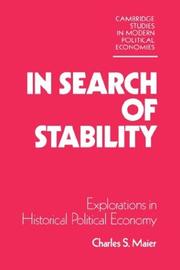
ISBN: 0521230012 0521346983 0511096755 0511583990 Year: 1987 Publisher: Cambridge
Abstract | Keywords | Export | Availability | Bookmark
 Loading...
Loading...Choose an application
- Reference Manager
- EndNote
- RefWorks (Direct export to RefWorks)
In Search of Stability: Explorations in Historical Political Economy ponders the issue of how Western industrial societies overcame major challenges to political and economic stability in the twentieth century. Successive essays ask: what ideological messages did American influence transmit to Europe after World War I, then again after World War II? Did Nazis and Italian fascists share an economic ideology or impose a unique economic system in the interwar period and during World War II? How do their accomplishments stack up comparatively against those of the liberal democracies? After 1945, what was the relationship between concepts of productivity and class division? How have the major experiences of twentieth-century inflation arisen out of class and interest-group rivalry? Most generally, what has been the representation of interests in capitalist political economies?
Sociology of policy --- History of Europe --- anno 1900-1999 --- Europe --- Social Sciences --- Political Science --- Fascism --- Representative government and representation --- Parliamentary government --- Political representation --- Representation --- Self-government --- Constitutional history --- Constitutional law --- Political science --- Democracy --- Elections --- Republics --- Suffrage --- History --- Economic conditions --- Economic policy.
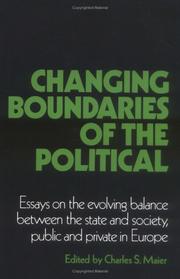
ISBN: 9780521348478 9780521343664 0521348471 0521343666 113917360X 9781139173605 Year: 1987 Publisher: Cambridge: Cambridge university press,
Abstract | Keywords | Export | Availability | Bookmark
 Loading...
Loading...Choose an application
- Reference Manager
- EndNote
- RefWorks (Direct export to RefWorks)
A new understanding of the nature of advanced industrial economies is derived from this extensive investigation of the ways in which the boundaries of the political have changed in Europe since the 1960s.
Privatization - Europe --- Europe - Politics and government - 1945 --- -Europe - Economic policy --- Europe - Social policy --- Privatization --- #SBIB:324H70 --- 202 --- 321.2 --- 330.548 --- 331.31 --- AA / International- internationaal --- EUR / Europe - Europa --- Papers prepared for a series of meetings of the Joint Committee on Western Europe --- 32.009.011 --- 32 <4-15> --- 32 <4-15> Politiek. Staatskunde. Staatswetenschappen --(algemeen)--West-Europa --- Politiek. Staatskunde. Staatswetenschappen --(algemeen)--West-Europa --- 32.009.011 Politieke machtsuitoefening --- Politieke machtsuitoefening --- Denationalization --- Privatisation --- Contracting out --- Corporatization --- Government ownership --- Politieke verandering: algemeen --- Sociale organisatie --- Economisch beleid van de overheid --- Nationalisatie. Privatiseringen --- Economisch beleid --- Europe --- Economic policy. --- Politics and government --- Social policy. --- Political sociology --- Social Sciences --- Political Science
| Listing 1 - 10 of 61 | << page >> |
Sort by
|

 Search
Search Feedback
Feedback About UniCat
About UniCat  Help
Help News
News